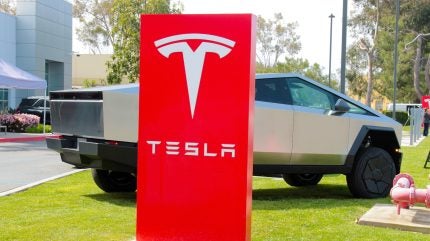
Tesla has directed its suppliers to avoid using components manufactured in China for vehicles destined for the US, reported The Wall Street Journal, citing sources.
The move comes as the company plans to reduce reliance on components produced in China amid deteriorating US–China ties.

Discover B2B Marketing That Performs
Combine business intelligence and editorial excellence to reach engaged professionals across 36 leading media platforms.
According to sources, Tesla decided earlier this year to stop using China-based suppliers for US-assembled cars.
Some China-made parts have already been replaced with components manufactured in other countries, and Tesla plans to move remaining components off China-origin supply within the next two years, the sources said.
The shift follows disruptions that began with the Covid-19 pandemic, which exposed vulnerabilities in parts flows from China.
Several China-based suppliers were prompted to relocate production to other countries, including Mexico.
The approach picked up pace this year after US President Donald Trump imposed heavy tariffs on Chinese imports, increasing uncertainty.
Recent geopolitical frictions have further complicated access to certain items.
In particular, tensions between China and the Netherlands led to fresh disruptions in chip supplies, and earlier in the year China imposed export restrictions on some rare earths and magnets used in vehicles.
Tesla’s global production footprint is split.
Vehicles for the US market are built at its US factories using local supply chains, while cars produced at its Shanghai plant rely primarily on locally made parts.
Shanghai-manufactured cars are shipped within China and to markets in Asia and Europe, except the US.
Many Chinese vendors have supplied parts to Tesla assembly plants beyond China.
The Shanghai factory alone worked with roughly 400 direct Chinese suppliers, over 60 of which provided components for Tesla’s global production.
Known substitution challenges remain. Lithium-iron phosphate (LFP) batteries from China’s Contemporary Amperex Technology (CATL) have been an important input.
Tesla sold US vehicles with Chinese-produced LFP batteries until last year, but those batteries are no longer qualified for specific EV tax credits and were subject to US tariffs, prompting the company to stop using them in US cars.
Tesla is pursuing domestic LFP production for its energy-storage business and has said it anticipates a Nevada facility to begin making such battery products in the first quarter of 2026.
In April, Tesla chief financial officer Vaibhav Taneja said that the company is working to produce LFP cells in the US and to secure additional suppliers outside China, while acknowledging the transition “will take time.”






